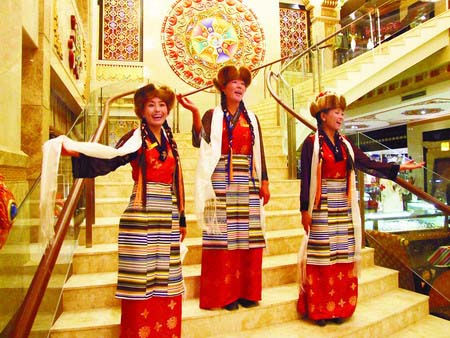Management
Lhasa hotel to showcase rich Tibetan culture
By Liu Jie (China Daily)
Updated: 2010-09-16 07:59
 |
Large Medium Small |
|
Employees of the Brahmaputra Grand Hotel greet guests with Tibetan songs. Provided to China Daily |
LHASA - With its cornucopia of exquisite Tibetan folk handicrafts and relics, the lobby of the Brahmaputra Grand Hotel in Lhasa looks more like a Tibetan cultural museum.
In fact, more than 14,000 cultural relics, artworks and folk utensils are on display in the five floors of the hotel, many of which are for sale, so it can also be regarded as a Tibetan folk culture market.
"It's a unique museum hotel, I think we are the only one in the world," said Zhang Xiaohong, founder and president of the Brahmaputra Grand Hotel, Lhasa's only five-star hotel.
The hotel was opened just two days before the launch of the Qinghai-Tibet railway on July 1, 2006. Its occupancy rate exceeded 80 percent in 2007's peak season, from July to October, much higher than the average of 40 to 50 percent in the autonomous region at the time.
Of the visitors, more than 75 percent were from North America, Europe and Southeast Asia.
The hotel earned healthy profits at the time. Zhang declined to disclose the exact figures, but pointed out that revenue from selling artworks was higher than from hospitality.
The March 4 Lhasa riot in 2008 dealt a blow to the hotel, with few visitors going to Tibet for about half a year. Brahmaputra Grand Hotel saw a revival from August 2008, though it was really slow, said Yu Xintao, executive general manager of the hotel.
The hotel enjoyed more stable business last year, with its occupancy rate climbing to 60 percent. But the profile of its guests has greatly changed, with many more visitors from Southeast Asia, and fewer from the Americas and Europe due to the financial crisis.
"This year, we have seen a boom in domestic visitors, with the majority coming from the Pearl River Delta, Zhejiang and Taiwan," said Yu, adding that the number of foreign guests is also growing, but at a more moderate rate.
She attributed this to the rising incomes of Chinese people. "We really cherish a peaceful Tibet and harmonious ethnic relations. This is good not only for local social and economic development but also for Tibetan cultural preservation," said Zhang, who has traveled to many remote areas in Tibet to collect folk artworks and talk with local people.
"The Tibetans are an ethnic group with rich cultural treasures," he said. Zhang recalled that, when visiting a Tibetan farmer's home, he was very surprised and excited to find that the farmer had a precious art collection.
The farmer, who lived in a shabby and small house with his family, built a storeroom for more than 100 scripture scrolls. The collection was entirely handmade and very well maintained.
"I was deeply impressed, as it was the first time I came to Tibet and I was moved by the place, the people and the culture," said Zhang. These visits further consolidated Zhang's desire to do more to promote Tibetan culture.
In 2004, Zhang, a Sichuan businessman, invested hundreds of millions of yuan to set up the Brahmaputra Grand Hotel. The money was from his Hongyan Supermarket chain. "The hotel, which is actually a combination of a hotel, a museum and a store, is running well, and we have no competitors here so far," said Yu.
She emphasized that the most important task now is promoting the hotel to more people in China and globally. "It's good for both our business and Tibetan culture," she said.
During the first six months of this year, the autonomous region received 1.8 million visitors, up 20.3 percent from a year earlier. Tourism revenue hit 1.39 billion yuan ($206.23 million), an increase of 23.6 percent compared with the same period of last year.
Eyeing the booming travel market, hospitality companies are eager to get a slice of the action.
A new five-star hotel is under construction in Lhasa and is expected to be officially opened in May 2012, while another five-star premium hotel is under construction in the Yarlung Zangbo Canyon, six hours' drive from Lhasa.
China Daily
